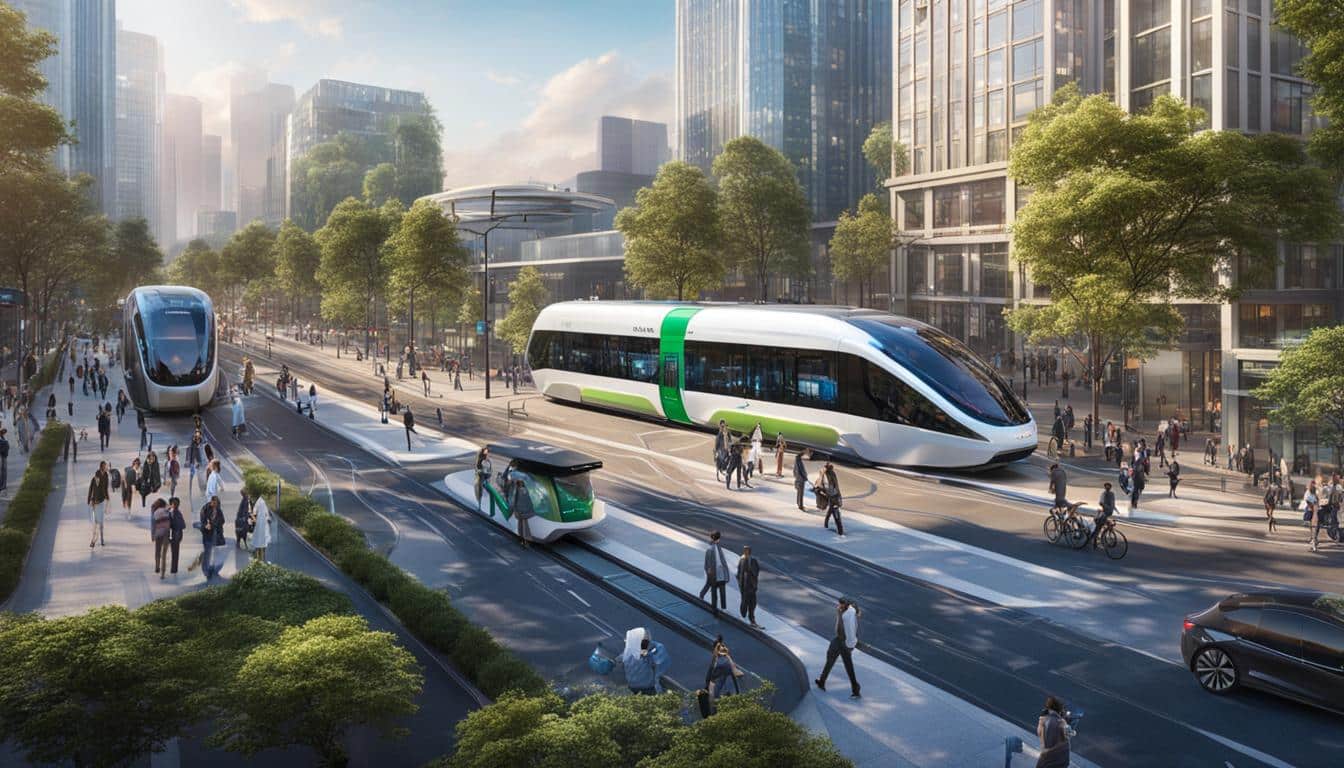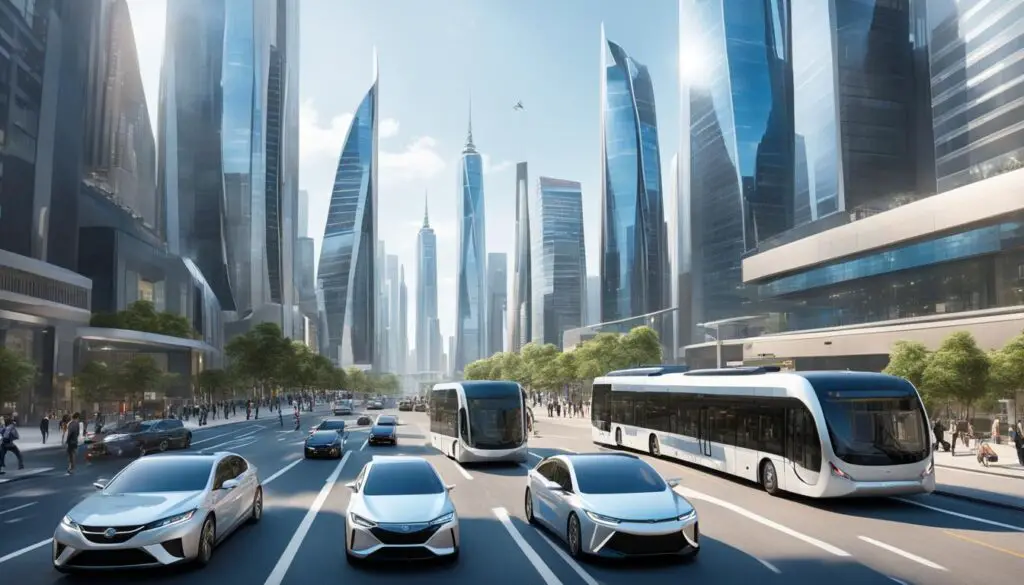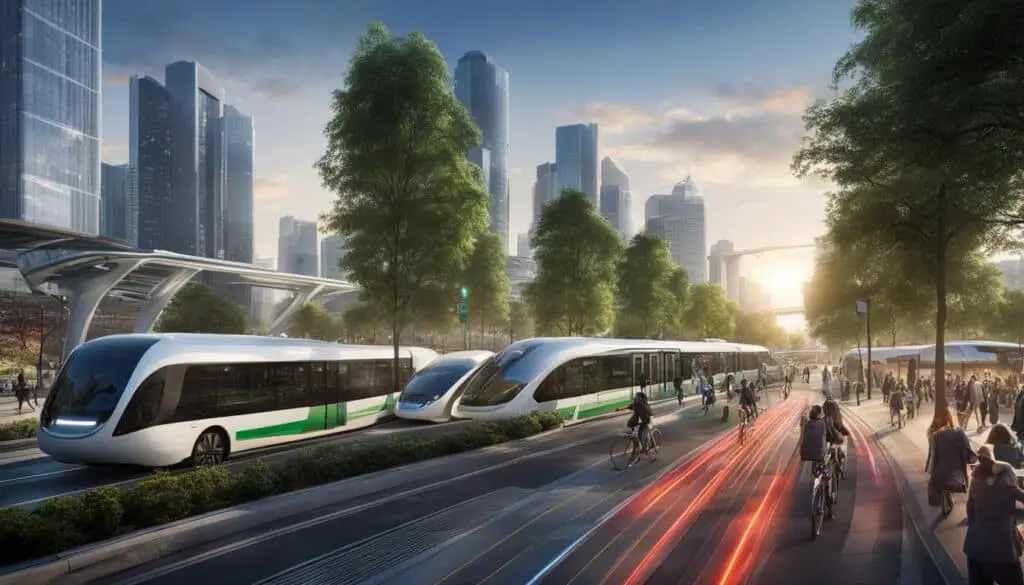
Smart City Initiatives: Redefining Urban Transportation Planning
Smart city initiatives are transforming the way transportation is planned and implemented in urban areas. These initiatives aim to leverage technology and data to create more efficient and sustainable transportation systems in cities. By integrating various modes of transportation, such as public transit, biking, and walking, smart cities are working towards reducing congestion, improving air quality, and enhancing the overall quality of life for residents.
These initiatives involve the use of advanced technologies like IoT, AI, and data analytics to optimize transportation networks, enable real-time monitoring and management of traffic, and provide personalized mobility solutions. These efforts are driven by the goal of creating a more sustainable future, where transportation is environmentally-friendly, equitable, and accessible to all.
Key Takeaways:
- Smart city initiatives transform transportation planning and implementation in urban areas.
- These initiatives leverage technology and data to create efficient and sustainable transportation systems.
- Integrating various modes of transportation reduces congestion and improves air quality.
- Advanced technologies like IoT and AI optimize transportation networks and offer personalized mobility solutions.
- Smart city initiatives aim to create a sustainable future with environmentally-friendly and accessible transportation.
The Role of Data in Smart City Transportation Planning
Data-driven decision-making is at the core of smart city transportation planning. By collecting and analyzing data from various sources, such as sensors, GPS devices, and mobile apps, cities can gain valuable insights into transportation patterns and trends. This data-driven approach enables cities to make informed decisions and optimize their transportation systems for efficiency and sustainability.
One of the key uses of data in smart city transportation planning is the identification of areas with high traffic congestion. By analyzing real-time traffic data, cities can pinpoint where congestion occurs, allowing them to implement targeted solutions such as traffic signal optimization or alternative routing options to alleviate congestion.
Data is also crucial in optimizing public transportation systems. Cities can analyze data on passenger demand, travel routes, and travel times to optimize bus and train schedules, ensure adequate service coverage, and reduce waiting times for passengers. This data-driven approach not only improves the efficiency of public transportation but also enhances the overall experience for commuters.
“Data-driven approaches enable cities to make more efficient use of existing infrastructure, reduce travel times, and improve overall transportation efficiency.”
The use of data in smart city transportation planning extends beyond traffic management and public transit optimization. Cities can utilize data to implement dynamic pricing for parking, effectively managing parking availability and reducing congestion caused by drivers searching for parking spaces. By adjusting parking prices based on demand, cities can incentivize drivers to consider alternative transportation options or park in less congested areas.
Data-driven decision-making also enables cities to adapt to changing mobility trends. For example, the rise of ridesharing services has transformed urban transportation. By analyzing ride-hailing data, cities can identify areas with high demand for ridesharing services and respond by implementing designated pickup and drop-off zones for these vehicles, reducing traffic disruptions.
Benefits of Data-Driven Decision-Making in Smart City Transportation Planning
The use of data in smart city transportation planning brings several benefits, including:
- Improved efficiency: Data-driven approaches optimize transportation systems, reducing travel times and congestion.
- Enhanced sustainability: By analyzing data, cities can develop strategies to reduce emissions and promote the use of sustainable modes of transportation.
- Smart infrastructure investment: Data helps cities identify areas where infrastructure improvements are needed most, ensuring efficient use of resources.
- Improved mobility services: By analyzing data on passenger demand, cities can provide personalized mobility solutions and improve the overall user experience.
Data Sharing and Collaboration for Innovation
Data sharing between different stakeholders is crucial for the success of smart city transportation initiatives. Collaboration between transportation agencies, private companies, and the public fosters innovation and the development of new mobility solutions.
By sharing data, cities can gain insights from various perspectives and benefit from the expertise of different stakeholders. For example, private companies can provide data on ridesharing patterns, allowing cities to better understand and respond to changing mobility needs. Similarly, public input and feedback can help shape transportation planning strategies and ensure they align with the needs of the community.
“Data sharing between different stakeholders fosters collaboration and enables the development of innovative mobility solutions.”
This collaborative approach to data-driven decision-making leads to more effective and inclusive transportation planning, ultimately resulting in improved mobility and quality of life for residents.
In conclusion, data plays a crucial role in smart city transportation planning. By leveraging data from various sources and applying data-driven decision-making, cities can optimize their transportation systems, reduce congestion, and improve overall mobility. The sharing of data between stakeholders promotes collaboration and innovation, leading to the development of new and improved mobility solutions.
Technology Innovations in Smart City Transportation
Smart city transportation initiatives are at the forefront of technological advancements, leveraging innovative solutions to improve mobility and enhance efficiency in urban areas. These technology innovations play a crucial role in revolutionizing the way transportation is planned, managed, and experienced.
One of the key components of smart city transportation is the use of IoT (Internet of Things) devices, which enable the collection of real-time data on traffic conditions and transportation infrastructure. By deploying IoT sensors throughout the city, valuable insights can be obtained to optimize traffic flow, reduce congestion, and improve overall transportation efficiency. This data-driven approach enables cities to make timely decisions and implement effective strategies to address traffic challenges.
Furthermore, AI (Artificial Intelligence) algorithms are being utilized in smart city transportation to optimize traffic signal timing and detect anomalies. AI-powered systems can analyze large volumes of data and make intelligent decisions to enhance traffic management. With AI, cities can adapt traffic signals in real-time, considering factors such as traffic volume, time of day, and even weather conditions. These dynamic adjustments streamline traffic flow, minimize delays, and improve the overall commuting experience.
Autonomous vehicles are another groundbreaking technology innovation in smart city transportation. These vehicles, equipped with advanced sensors and AI algorithms, have the capability to navigate and operate without human intervention. Autonomous vehicles offer numerous benefits, such as reducing accidents by eliminating human error, optimizing traffic flow through precise coordination, and enhancing transportation accessibility for individuals who cannot drive. As autonomous vehicle technology continues to evolve, cities are exploring their integration into transportation systems to improve safety and efficiency.
Smart city transportation initiatives also leverage various other technological advancements to provide convenient and sustainable transportation options to residents. Mobile apps enable users to access real-time information about transit schedules, plan routes, and even make payments for various modes of transportation. Smart parking systems help optimize parking availability by using sensors to detect and guide drivers to available parking spaces. Additionally, electric vehicle charging infrastructure is being deployed to encourage the use of electric vehicles, reducing greenhouse gas emissions and promoting sustainable transportation.
Benefits of Technology Innovations in Smart City Transportation
- Enhanced transportation efficiency and reduced congestion
- Improved traffic management and optimized traffic flow
- Enhanced safety through autonomous vehicles and AI algorithms
- Convenient and user-friendly transportation options through mobile apps
- Promotion of sustainable transportation through electric vehicle charging infrastructure
Challenges of Technology Innovations in Smart City Transportation
- Significant investment and coordination required for implementation
- Addressing privacy and data security concerns
- Ensuring equitable access to transportation services for all residents
- Integration of new technologies with existing infrastructure
In conclusion, technology innovations are driving significant changes in smart city transportation, revolutionizing urban mobility and paving the way for a more connected and sustainable future. By leveraging IoT, AI, autonomous vehicles, and other advancements, cities can optimize transportation systems, enhance efficiency, and improve the overall quality of life for residents.

Benefits and Challenges of Smart City Transportation Initiatives
Smart city transportation initiatives bring a multitude of benefits for urban mobility. By optimizing transportation systems and promoting sustainable modes of transportation, cities can address key challenges and improve the overall quality of life for their residents.
Benefits:
- Traffic Congestion Reduction: Smart city transportation initiatives help alleviate traffic congestion by implementing intelligent traffic management systems. These systems leverage real-time data and advanced analytics to optimize traffic flow, reduce bottlenecks, and enhance overall transportation efficiency.
- Emissions Reduction: By promoting the use of sustainable transportation options, such as electric vehicles and public transit, smart cities can significantly reduce harmful emissions, leading to improved air quality and a healthier urban environment.
- Improved Accessibility and Affordability: Smart city transportation initiatives aim to enhance the accessibility and affordability of transportation for all residents, regardless of their socioeconomic status. This includes the development of efficient and affordable public transit systems, bike-sharing programs, and pedestrian-friendly infrastructure.
- Enhanced Road Safety: Implementing smart traffic lights, intelligent pedestrian crossings, and road safety monitoring systems can significantly improve road safety. These initiatives help reduce accidents, protect pedestrians, and ensure a safer traveling experience for all road users.
- Enhanced Efficiency and Travel Time: Smart city transportation initiatives enable optimized routing systems, real-time traffic updates, and personalized journey planning. This improves travel efficiency, reduces travel time, and provides residents with smoother and more predictable commuting experiences.
Challenges:
However, implementing smart city transportation initiatives also poses some inherent challenges that need to be carefully addressed for successful implementation:
- Significant Investment: Implementing new technologies and infrastructure requires substantial financial investment. This may pose a challenge for cities with limited budgets and resources.
- Coordination between Stakeholders: Smart city transportation initiatives involve various stakeholders, including government agencies, private companies, and citizens. Coordinating these stakeholders and ensuring effective collaboration can be complex.
- Privacy and Data Security: The collection and utilization of data in smart city transportation systems raise concerns about privacy and data security. It is essential to establish robust data protection measures and ensure responsible use of personal information.
- Equitable Access: Ensuring equitable access to transportation services for all residents, including vulnerable populations, is crucial. Smart city transportation initiatives should address accessibility challenges and consider the needs of diverse communities.
While smart city transportation initiatives offer significant benefits, the challenges should not be underestimated. Through careful planning, effective governance, and stakeholder collaboration, cities can overcome these challenges and pave the way for a future of efficient, sustainable, and accessible urban mobility.

Conclusion
Smart city initiatives are revolutionizing transportation planning in urban areas, paving the way for a more sustainable, efficient, and accessible future. By harnessing the power of technology, data, and innovative solutions, these initiatives aim to optimize transportation networks, reduce congestion, and enhance the overall quality of life for residents.
Through the integration of various modes of transportation and data-driven approaches, smart cities are able to create more efficient and seamless mobility solutions. By leveraging technologies like IoT and AI, cities can collect real-time data, improve traffic management, and provide personalized transportation options to residents. These advancements in transportation planning have the potential to alleviate congestion, reduce carbon emissions, and create a more equitable and inclusive urban environment.
However, the implementation of smart city transportation initiatives comes with its own set of challenges. These include the need for significant investment, coordination among multiple stakeholders, and addressing privacy concerns. Efforts must be made to ensure data security and protect the privacy of individuals while leveraging data for improved transportation planning and management.
Despite these challenges, the benefits of smart city transportation initiatives cannot be overlooked. By redefining urban mobility, these initiatives have the power to transform cities into more sustainable and livable spaces. With ongoing innovation and collaboration, smart city initiatives will continue to shape the future of transportation, creating a more connected, accessible, and environmentally-friendly urban landscape.
FAQ
What are smart city initiatives?
Smart city initiatives are projects aimed at leveraging technology and data to create more efficient and sustainable transportation systems in urban areas. These initiatives integrate various modes of transportation and use advanced technologies like IoT, AI, and data analytics to optimize transportation networks and provide personalized mobility solutions.
How does data play a role in smart city transportation planning?
Data plays a critical role in smart city transportation planning by providing valuable insights into transportation patterns and trends. By collecting and analyzing data from various sources, cities can make informed decisions and optimize transportation systems. This includes identifying areas with high traffic congestion, optimizing bus routes based on passenger demand, and implementing dynamic pricing for parking.
What technology innovations are used in smart city transportation?
Smart city transportation initiatives utilize a range of technology innovations, including IoT devices for real-time data collection, AI algorithms for traffic optimization, and autonomous vehicles for enhanced safety and efficiency. Other technologies like mobile apps, smart parking systems, and electric vehicle charging infrastructure also contribute to convenient and sustainable transportation options.
What are the benefits and challenges of smart city transportation initiatives?
Smart city transportation initiatives offer benefits such as reduced traffic congestion, lower emissions, improved air quality, increased accessibility, and improved road safety. However, implementing these initiatives comes with challenges, including the need for investment and coordination between stakeholders, addressing privacy and data security concerns, and ensuring equitable access to transportation services.
Source Links
- https://royalexaminer.com/james-lee-jimmy-compton/
- https://news.europawire.eu/sap-appoints-new-board-area-for-cloud-growth-and-welcomes-muhammad-alam-to-executive-board/eu-press-release/2024/01/10/13/55/32/127889/
- https://www.indianretailer.com/news/retail-india-news-mytrident-introduces-375-thermal-comfort-bed-sheets-elevating-winter-comfort
